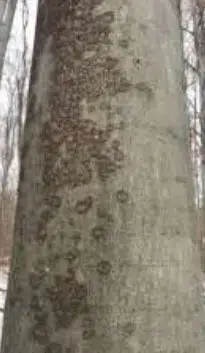
Beech Bark disease is wreaking havoc in Renfrew County forests.
It’s estimated the majority of beech trees at Shaw Woods will die within the next 5-years. It’s possible that a very small percentage (<2%) of beech may be immune.
The impacts at Shaw Woods are most noticeable along the Old Growth Trail at Shaw Woods where the beech trees are already exhibiting various forms of wood rot, broken branches and tree tops.
Beech Bark Disease is an infection of the inner bark of the beech tree caused by a non-native insect-fungus complex and restricts the movement of nutrients from the roots to the top of the tree. Beech Bark Disease appears as circular or lemon shaped cankers on the outer bark of the tree. The infected trees can also exhibit other signs of weakness such as deformation of the stem, broken off branches and tops, and various forms of wood rot fungi.
Beech Bark Disease only affects beech trees.
The rot created as a result of Beech Bark Disease poses a serious safety hazard as the infected trees are prone to breakage and can easily snap off during windy days and under heavy snow.
During the recent wind storms in December, a number of trees at Shaw Woods were severely damaged creating a significant safety risk along the Old Growth Trail.
As a result of the recent serious blowdowns immediate action is being taken to mitigate risks.
Co-Chair of the Board of Directors Fred Blackstein says the safety of students and visitors to Shaw Woods is a major concern.
The Old Growth Trail is currently closed to visitors.
Efforts will be made during the tree removals to reduce the impacts to the local ecosystem by minimizing ground disturbance, and leaving the felled material on the ground to decompose adding nutrients to the soil and providing woody material for salamanders and other wildlife.
Volunteers continue to monitor the trails for hazards and remove the visibly declining beech trees that pose a risk to the public.
Within the next few weeks visitors to Shaw Woods Outdoor Education Centre can expect to see remedial work begin to ensure that the safety of the trails for visitors is protected.
If you see an unsafe situation, speak to someone at Shaw Woods or send an email to: shawwoods.edu@gmail.com.
Back in October of 2021, Renfrew County Forester Lacey Rose raised concerns about the Emerald Ash Borer (EAB), the LDD moth (formerly known as the Gypsy moth), Beech Bark Disease, Black Legged Ticks, Butternut Canker, and Garlic Mustard.
PREVIOUS STORIES:
Renfrew County using wasps to control EAB and wants endangered designation for Black Ash removed

